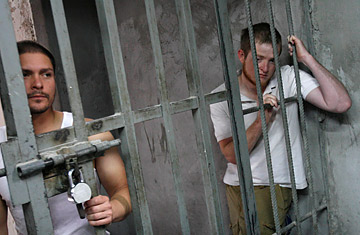
Carlos Quijas (L) and Shohn Huckabee, U.S. citizens and inmates at the jail in Ciudad Juarez, September 24, 2010. The two were sentenced to five years in prison for drug trafficking.
(2 of 2)
There seem to have been plenty of those. Beyond even the allegations of torture, there are deep questions about the chain of command of the drugs (not to mention of the American suspects) on the night of the arrest. As the Wall Street Journal reported, three eyewitnesses told the court that they saw the Mexican military plant the drugs. One of them, a window washer named José Antonio Bujanda, was murdered last July in a yet unsolved killing.
De la Rosa, a silver-haired former academic who says he lives in "high danger" because of his work, calls Shohn's story "a prototypical case of what's happening in Mexico." In part, the breakdown of justice can be traced to the military's brief and inglorious turn, which ended in April 2010, as the primary law enforcement on the streets of Juárez. Brought in to replace the corrupted city police force — and bolstered in part by U.S. support and funding under the 2008 Mérida Initiative — they proved too blunt an instrument for fighting organized crime. "The military comes with a logic of suspending individual rights," he alleges. "They were looking for names from [the Americans], and when they didn't get them through torture, they decided to put the drugs on them."
But it's not only the procedures of the military that are said to be questionable. De la Rosa's office has put seven federal police in prison for theft, along with three municipal police for "disappearing" four people; it is also pursuing two open cases of federal police homicide.
Cereso prison, where Shohn Huckabee is incarcerated, is not a safe place. In April I went to the outskirts of the prison, which lies well outside of Juárez proper, not to interview Shohn, but to visit the murder scene of a prison guard who was gunned down in a prisoner transport van just outside the gates. The crime, part of an escape attempt, made the military and police securing the crime scene so jumpy that as soon as we drove up the the scene, a babyfaced federal police officer ran at us and raised his automatic rifle, about to shoot: the attackers, he explained to us later, had come in a Jetta, the same make of vehicle we were driving. "It's good I didn't shoot you," he said, altogether too casually.
Shohn says the violence continues inside Cereso, home to some 4,000 prisoners, as well. "The area I'm in, I feel kinda safe," he says after his father puts him on the phone. "But we've had gunfights everything else across the patio." Another guard was murdered earlier this month, Shohn says. After the killing, other prison guards went from cell to cell, collecting 10 or 20 pesos from each prisoner to give to the guard's family.
But in one sense, Shohn is lucky to still be in Cereso. In what Shohn says was a surprise to both men, his co-defendant and friend Carlos Quijas was recently transferred to Islas Maria, the notorious penal colony off the Pacific Coast of Mexico, on the other side of the country. Shohn says neither he nor Quijas' family have heard from him since the transfer.
As for his own emotions leading up to the ruling, Shohn is muted. "Well, I'm just waiting. I'm hoping it comes out well," he says. He's more voluble about the other inmates he says have had the same experience as him. "I couldn't even count the number of cases in here where the military has put drugs on people," he says. "Out of 200 people in our area [of Cereso], there's 60 or 70 people easily where the military framed them, tortured them and threw them in here."
That there are so many other possible innocents means that no matter what the ruling on Shohn's case, there will be few real winners. If the appeal fails, he'll have to serve more than three more years in prison. If it succeeds, he will have been freed mainly because of the extraordinary advocacy of his family and supporters, not because of any self-correcting mechanism in the Mexican justice system. There will be plenty of others left behind in prison, unable to find their way out.
